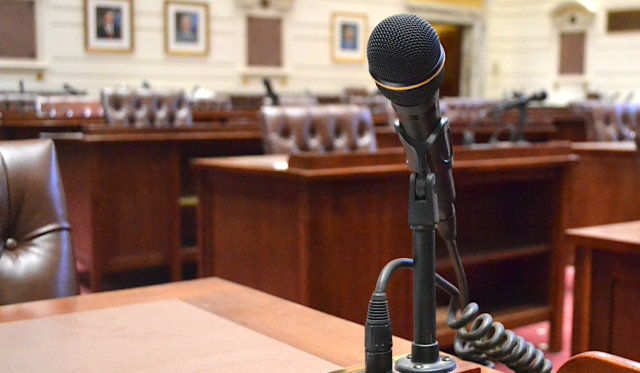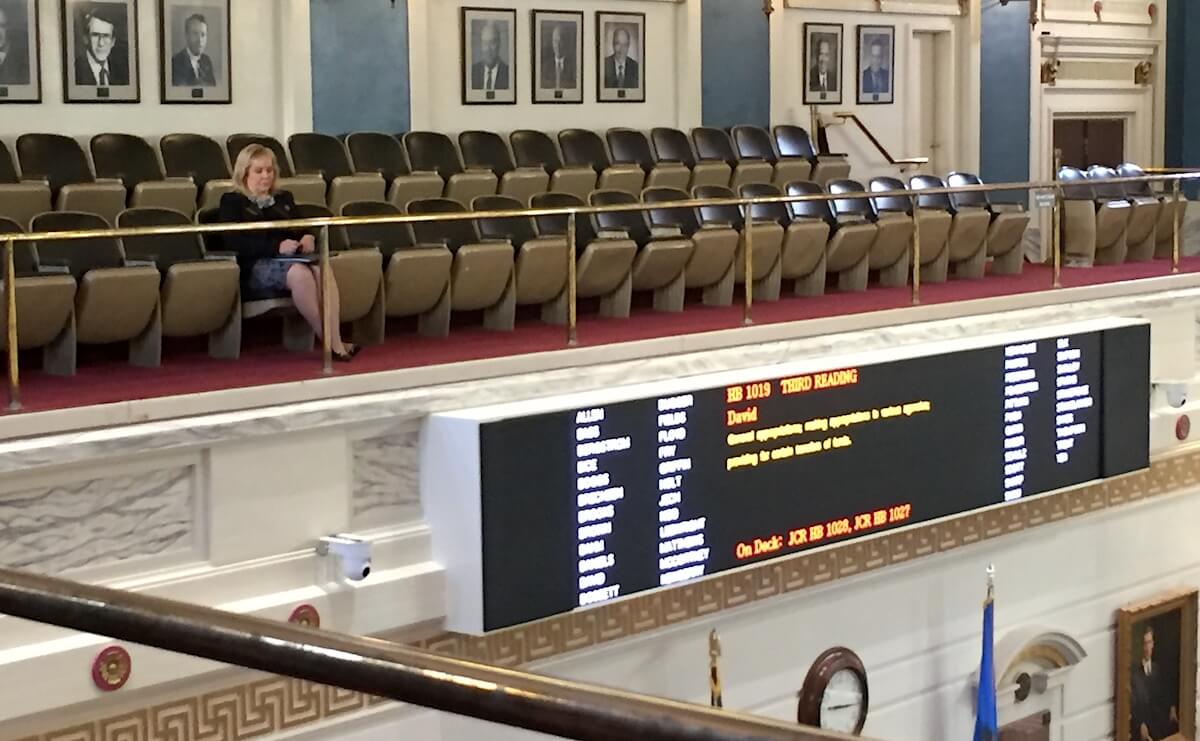
With her ankles crossed and a solemn look on her face, Gov. Mary Fallin sat above the Oklahoma State Senate’s voting board and listened to debate on an updated appropriations bill that cuts dozens of state agencies about 2.4 percent.
One week after a compromise revenue package fell short in the House, the Senate passed the House’s “cash and cuts” plan that will end special session, should Fallin sign it. While the Senate debated Friday morning, the House moved sine die to adjourn out of session.
“I’ve asked [the House] several times — even this week — please reconsider ‘Plan A+’, but they don’t want to do that,” Fallin told NonDoc Wednesday morning prior to the House’s passage of HB 1019. “They said they can’t get the votes. But you don’t know until you’ve tried.
“I’ve also said, I don’t want you spending all the $83 million in cash because we know, come February, we’ve got a $550 million shortfall, and the bond agencies are already downgrading us.”
Ultimately, pleas from senators that the cuts proposal be rejected were not enough, with the bill passing 29-14 after about an hour of questions and debate.
Sen. Roger Thompson (R-Okmulgee) debated against the bill, noting that “some may have to die” is not an acceptable attitude toward potential nursing home cuts.
“This is only my third year in this body, and I must say without any doubt in my mind, the bill that we are about to be called upon to vote on is probably one of the worst pieces of legislation that has ever come across my desk,” Thompson said. “However you vote on the bill, I want you to be aware where we are fiscally inside the state. I believe we are in a place where we have been using our credit to buy groceries and we have been making the minimum monthly payment.”
Thompson said HB 1019 uses $106 million one-time money and will increase next year’s budget hole to more than $670 million.
“The last two nights I have slept very little, hopefully like most of you,” Thompson said. “This is exactly the most fiscally irresponsible move we could make as a body because we are setting ourselves up for failure in two months.”
Ironically, Thompson ultimately voted for the bill.

Cuts ‘will fall most heavily on rural districts’
Despite his vote, Thompson was far from the only senator to debate against the cuts.
“We have to keep trying. We have to push past our fatigue. We have to push past our frustration, and we have to stay here until we get this done,” said Sen. Kay Floyd (D-OKC). “There’s no reason to think it’s going to change unless we change and we are better.”
Sen. Frank Simpson (R-Ardmore) said the bill gives false hope to Oklahomans using state services.
“This bill solves no problems. All it does is kick the can down the road for a couple of months,” Simpson said. “The rural legislators agree that if this bill passes it will fall most heavily on the rural districts. If this bill doesn’t pass, it will fall most heavily on the rural districts. That seems to be the way (this works).”
But ultimately, Simpson said he would support it, seemingly resigned to an inability for the House to achieve 76 votes for revenue increases.
Sen. Kim David (R-Wagoner) carried the bill and said the House’s failure broke her heart, but also argued that there was no other option at hand.
“If you think that House, who just sine die’d, is going to be here for two more weeks to find a solution, you are sadly mistaken,” David said Friday. “They had some bipartisan support, but at the leadership level they did not,” David said. “They have (worse) battles of there. I feel like our body is much more cohesive.”
AJ Griffin (R-Guthrie) debated against the bill, her voice quivering with emotion as she began.
“I’m not ready to quit fighting. I’m tired, I’m exhausted, I’m furious, I’m livid, I’m angry, I’m upset,” Griffin said. “I want to throw up every time I walk into this building. But I’m not ready to quit fighting because I don’t think we have done everything that we can.”
Griffin referenced how the Oklahoma Legislative Compensation Board voted to cut lawmaker pay, saying that those who voted do not understand the work of representatives and senators in the Capitol or in their districts.
“I know it breaks everyone’s heart to even think about walking in here Monday morning, but I’m willing to keep fighting,” Griffin said.
Senate raises GPT on ‘legacy wells’
Earlier Friday morning, the Senate passed a hike in gross production taxes from 4 percent to 7 percent on a specific set of oil and gas wells called “legacy wells.” Those wells had already been raised in the spring from 1 percent to 4 percent, and they were already scheduled to reach 7 percent in a little more than a year.
The Senate passed that bill 27 to 15 and moved sine die itself shortly after 10 a.m.
Text of HB 1019 appropriations bill
 Loading...
Loading...
(Update: This story was updated at 10:45 a.m. Friday, Nov. 17, to cite a quote in verbatim.)





















